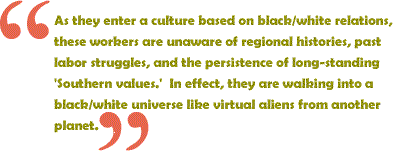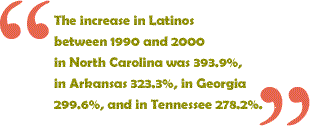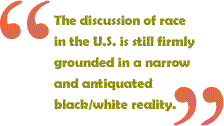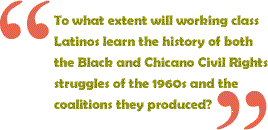|

Now
that Senator Trent Lott (R. Miss.) has resigned as Senate Majority
Leader, the news cycle has moved on to other issues. But the
Lott Affair ought not to be shoved under the rug so quickly.
For Latinos in particular, the episode raises a number of intriguing
issues. Despite the hoary black/white paradigm that still determines
all discussions about race in the United States, demographic
changes tell us that Latinos will have much at stake in the
on-going economic and racial realignment of American society.
Taking
Lott as a symptom of a wider context, what do we know so far?
Lott's flirtations with the deepest racist elements of Southern
culture span his entire adult life. As a student at the University
of Mississippi, he led efforts to resist integration of his
fraternity. His votes against the Martin Luther King, Jr. holiday
and other more substantive civil rights legislation are well
documented. Throughout the 1980s, Lott contributed a regular
column to the Citizen Informer, a newsletter published by the
Council of Conservative Citizens, and appeared in recruiting
videos for an organization called the Sons of Confederate Veterans.
It
is a little known fact that during the Reagan-Bush retrenchment
a Neo-Confederate movement  emerged
across the Deep South. Lott was a key player and often boasted
that Republican Party programs were reviving "the spirit
of Jefferson Davis," the former president of the Confederacy.
The Council of Conservative Citizens, known as the "uptown
Klan," was a direct descendant of the radical segregationist
White Citizens' Councils of the 1950s. emerged
across the Deep South. Lott was a key player and often boasted
that Republican Party programs were reviving "the spirit
of Jefferson Davis," the former president of the Confederacy.
The Council of Conservative Citizens, known as the "uptown
Klan," was a direct descendant of the radical segregationist
White Citizens' Councils of the 1950s.
What
does all this have to do with Mexicans and other Spanish-speaking
groups? Over the last decade, Mexican and Latino immigrants
have moved in large numbers into the old Confederacy. According
to the most recent census, the increase in Latinos between 1990
and 2000 in North Carolina was 393.9%, in Arkansas 323.3%, in
Georgia 299.6%, and in Tennessee 278.2%. In Lott's home state,
the number of Latinos more than doubled. Whereas in 1990 only
19 of the state's 82 counties had 200 or more Latino residents,
by 2000 more than half or 48 counties had 200 or more. And these
numbers are probably too low given the census bureau's track
record of undercounting Latinos.
From
a Chicano perspective, a number of interesting questions arise
from these demographic changes. Since most of the new Latinos
in the South are first-generation immigrants they have little
if any knowledge of the Chicano struggles for equal rights and
the history of anti-Mexican racism in the Southwest. As they
enter a culture based on black/white relations, these workers
are unaware of regional histories, past labor struggles, and
the persistence of long-standing "Southern values."
In effect, they are walking into a black/white universe like
virtual aliens from another planet.
 The
history that is unknown to these recent immigrants is also unknown
to most white and African American progressives. During the
Viet Nam War period, people of Mexican descent mounted a multi-faceted
social movement that included a labor sector (Cesar Chavez and
the United Farm Workers), a land redistribution fight in New
Mexico (Reies Tijerina), a political third party, an anti-war
sector, a Chicana feminist agenda, and a wide array of cultural
and political organizations demanding civil rights reform or
revolution and everything in between. The
history that is unknown to these recent immigrants is also unknown
to most white and African American progressives. During the
Viet Nam War period, people of Mexican descent mounted a multi-faceted
social movement that included a labor sector (Cesar Chavez and
the United Farm Workers), a land redistribution fight in New
Mexico (Reies Tijerina), a political third party, an anti-war
sector, a Chicana feminist agenda, and a wide array of cultural
and political organizations demanding civil rights reform or
revolution and everything in between.
Contact
between Chicano and Black activists was often intense. In 1967,
Tijerina began a close relationship with SNCC, the Black Panthers,
and other militant groups. Chicanos participated in the New
Politics Conferences and the Poor People's Campaign. One of
Dr. King's planned stops after visiting striking sanitation
workers in Memphis in April of 1968 was to have been Delano,
California, and a meeting with Cesar Chavez. The meeting never
happened; the spectre of a Brown/Black coalition may have been
one reason why.
Fast
forward to the present. The recent influx of Spanish-speaking
workers, many of them in the lowest echelons of the poultry
industry, has not gone unnoticed by right-wing groups. A spokesman
for one of Senator Lott's preferred organizations, the Council
of Conservative Citizens, for example, declared in 1998: "The
litmus test is where do the politicians stand on immigration
and race. If we lose and we cease to exist, the new Mexican
majority will not preserve our Confederate flag or our Confederate
monuments because our people will be gone." The level of
white fear expressed here by Atlanta attorney Sam Dickson is
high, and we can only assume he is not alone in seeing Mexican
immigrants and their Mexican American children as a threat to
the kind of Southern society Strom Thurmond and Trent Lott continue
to promote.

The
media coverage of the Lott affair reminds of us of two important
facts: 1) the discussion of race in the U.S. is still firmly
grounded in a narrow and antiquated black/white reality and
2) despite the Republican Party's attempt to distance itself
from Lott and his ilk, it continues to be a party whose electoral
victories are totally dependent on the old Confederate core.
The civil rights voting record of new Senate Majority Leader
Bill Frist (R. Tenn.) on issues affecting Latinos, Blacks, women,
and gays is just as bad if not worse than that of Trent Lott.
What
all this will mean for the majority of Latinos (leaving aside
the extreme pro-Bush elements in Florida's Cuban community)
remains to be seen. How will the legacy of white supremacy in
the South affect Mexican immigrants and their children? To what
extent will working class Latinos learn the history of both
the Black and Chicano Civil Rights struggles of the 1960s and
the coalitions they produced? Will discrimination in education
and housing and economic inequality in general eventually lead
to a new Mexican American militancy that will rise up this time
not in the Southwest but deep in the heart of Dixie?
Jorge
Mariscal is an Associate Professor of Literature and Director
of the Chicano/a~Latino/a Arts and Humanities Program at the
University of California, San Diego.

www.blackcommentator.com
Your
comments are welcome. Visit the Contact
Us page for E-mail or Feedback.
Click
here to return to the home page
|

